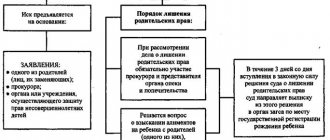Alimony that may oblige the ex-husband to pay
1.1. Child support
According to the Family Code of the Russian Federation (FC RF), the father of a child, like the mother, is obliged to financially support his children, both before the children reach adulthood, but also after reaching adulthood - in case of their incapacity for work.
There are several forms of determining and collecting alimony:
a) as a percentage of income;
b) in a fixed amount of money;
c) in mixed form.
If the ex-husband has a stable “white” salary, then alimony, as a rule, is approved as a percentage of it. The law does not strictly establish the upper and lower limits of the amount of alimony, however, the approximate limits of this amount are still indicated in the law:
a) one quarter of income - to support one child;
b) one third of income - to support two children;
c) half of the income is for the maintenance of three or more children.
However, it must be remembered that the RF IC obliges the judge to consider the financial situation and marital status of each parent in order to finally determine the amount of alimony for a particular case. That is, theoretically, the different income levels of ex-husbands, as well as the different number of children or other dependent relatives, should be taken into account in the amount of finally approved alimony. In practice, however, this is not the case, and child support is most often stated as standard, that is, simply depending on the number of children.
If the ex-husband has unstable earnings, a “gray” or “black” salary, determining the amount of alimony as a percentage will be unprofitable for the child. In this case, lawyers advise demanding in court alimony in a fixed amount of money, a multiple of the subsistence minimum approved in a particular region of Russia. As a rule, based on the fact that two parents must financially support the child, the judge does not approve the amount of alimony lower than half the minimum subsistence level.
The same form of collection is also used to pay alimony for adult able-bodied children if they are in a state of need and cannot independently provide all their vital needs.
1.2. Alimony for ex-wife
Family law obliges the ex-husband to participate in the financial support of his ex-wife in the following cases:
a) if the ex-wife is pregnant - within 3 years from the date of birth of the common child (children);
b) if the ex-wife is raising a disabled child together - until this child reaches 18 years of age;
c) if the ex-wife is raising a common child who has been disabled since childhood;
d) if the ex-wife is disabled and is recognized as needy (in this case, disability can occur either before the divorce or within 1 year from the date of divorce);
e) if the needy ex-wife reaches retirement age no later than five years after the divorce, provided that the marriage of this couple was long.
Moreover, this type of alimony is approved in the same ways as child support:
a) an agreement on the payment of alimony;
b) within the framework of writ proceedings;
c) within the framework of claim proceedings.
However, remember that alimony for the maintenance of an ex-wife is established in a fixed amount of money paid every month, and not as a percentage of the ex-husband’s income.
Content
1. Mechanism of enforcement proceedings
2. From what sources are amounts of money collected to eliminate debts?
3. How is the penalty calculated and collected on debt obligations?
4. Mechanisms influencing the defaulter established by law
5. Deprivation of parental rights for non-payment of child support obligations
6. Criminal liability for non-payment of alimony
7. Is it possible to release the debtor from paying alimony arrears?
Responsibilities for paying child support are assigned to the parent living separately from the child. After the divorce process, the volume and procedure for payment of alimony obligations are established by a settlement agreement between the spouses or by the court (formation of a decision or order).
In situations where funds are not paid to the alimony recipient on time, arrears on alimony obligations are formed. There are situations when the debt becomes impressive and is not paid off by the alimony provider.
In this article we will look at what actions to take in this situation and what mechanisms exist for collecting alimony.
Procedures for collecting alimony
How much alimony and how to pay it parents can determine on their own, in which case they can prepare and sign an agreement on the payment of alimony, and later be sure to have it certified by a notary.
However, if the ex-husband refuses to pay alimony under the agreement, then in such a situation it is impossible to do without a trial.
Unfortunately, many women do not know that alimony can be collected in court not only as part of a suit that is quite costly both in terms of time and finances, but also through writ proceedings, which is much faster, simpler and requires a minimum of financial costs .
2.1. Order proceedings
A simplified judicial method is writ proceedings, which are initiated by means of an application for the issuance of a court order. It must be drawn up in accordance with civil procedural legislation (Civil Procedure Code of the Russian Federation) and the necessary documents confirming your requirements must be attached to it.
Please note that this method has limitations:
a) in this way it is impossible to collect alimony in a fixed sum of money, since it will be necessary to prove the circumstances associated with the collection in a fixed sum of money, and not as a percentage of earnings;
b) it is also impossible to collect alimony of a larger amount than is fixed in family law;
c) alimony cannot be collected if the application also contains requirements for establishing paternity;
d) alimony cannot be collected if the second parent is already paying alimony (in this case, third parties will have to be involved in the proceedings).
This confirms that this simplified method is suitable for the most standard situations, when they require the amount prescribed by law and the debtor is generally not against it, and the establishment of alimony does not concern third parties.
So, an application for a court order must be submitted to a magistrate, who will consider it and the attached documents within 5 days, without summoning the parties. The result of this consideration will be the issuance of a court order and its direction to the debtor, who in turn has 10 days to submit to the court objections to the court order, if any.
If the judge receives objections, he will have to cancel the court order, because this will mean that there is a dispute between the parties, and all such legal disputes are considered within the framework of lawsuit proceedings.
2.2. Claim proceedings
On October 1, 2021, changes to civil procedural legislation came into force. From now on, all claims for the collection of alimony must be filed in district courts of general jurisdiction, and not in magistrates' courts.
To initiate legal proceedings, you must draw up and submit a statement of claim according to the rules of the Code of Civil Procedure of the Russian Federation, and attach documents to it that prove your position.
Remember that you do not have to pay a state fee to collect alimony as part of a claim proceeding.
Next, you need to take part in the preliminary hearing, then in the court hearings themselves: consider evidence, listen to witnesses, prove your position, referring to the norms of family, civil and procedural legislation, ask questions to the other party, etc.
Based on the results of consideration of your dispute, the judge will issue a ruling (court decision) that may suit you. Otherwise, you will have to appeal it to the appellate court.
If you doubt that you will be able to draw up procedural documents for the court strictly in accordance with the requirements of the law, as well as to best defend your position in court and counter the objections of the other party, consider contacting qualified family dispute lawyers.
Regulatory framework
| Laws | Articles |
| Family code | Article 69 – grounds for annulment of a parent’s rights to a minor child. Article 70 – features of the judicial procedure during which a decision is made to annul the rights of a parent to a minor child. Article 114 – grounds and procedure for releasing the alimony holder from repaying alimony debts. Article 115 – forms of liability for alimony providers who approach the issue of alimony payment irresponsibly. |
| Code of Administrative Offenses | Article 5.35.1 describes what threatens alimony defaulters if an administrative case is opened against them. |
| Criminal Code | Article 157 describes what awaits alimony defaulters if a criminal case is opened against them. |
Actual collection of alimony
Not only are some ex-husbands in no hurry to pay alimony on their own initiative, but there are also those who are found not paying alimony even after a court decision has been made.
Despite the fact that the execution of a voluntarily concluded agreement on the payment of alimony or a court decision on the collection of alimony is mandatory for the debtor, there is often a situation in which the ex-husband does not pay alimony, which leads to a financially disastrous situation for the ex-wife and child ( children).
So who is involved in the actual collection of alimony? The Federal Bailiff Service and its territorial divisions are responsible for the forced collection of debts in Russia.
3.1. Powers of bailiffs
Recent changes made to federal legislation and which came into force on January 1, 2021, regulating the position of bailiffs, not only expanded the powers of bailiffs, but also increased their liability for failure to perform or improper performance of duties.
So, let's consider two situations:
A. Failure to comply with an agreement to pay alimony. This document itself has the legal force of an executive document, therefore, you do not need to obtain anything additional to contact the bailiffs.
b. Failure to comply with a court decision to collect alimony. In this case, you need to request a writ of execution from the court.
To initiate enforcement proceedings, it is necessary to submit to the bailiffs an agreement on the payment of alimony, a writ of execution, a court order, and also prepare an application to initiate enforcement proceedings. Then the bailiff makes a decision to initiate enforcement proceedings within 3 days.
To collect your alimony, the bailiff may take the following actions:
a) obtain information about the debtor from various government agencies and organizations and check financial information, invite the alimony provider to meetings;
b) instruct individual entrepreneurs and organizations to carry out enforcement documents, that is, for example, the alimony provider’s employer to deduct alimony amounts from his salary and directly transfer it to his ex-wife;
c) search, arrest and confiscate the property of the alimony provider;
d) temporarily prohibit the alimony worker from leaving the territory of Russia;
e) temporarily prohibit driving a vehicle;
f) temporarily prohibit the alimony holder from disposing of his property, in particular, temporarily prohibit him from performing registration actions in relation to his property;
g) initiate a case of an administrative offense against the alimony provider, etc.
Remember that you can file a demand for a temporary restriction of your debtor’s right to leave the territory of Russia, or the bailiff can do this on his own initiative if:
a) the alimony holder owes more than 10,000 rubles;
b) more than 2 months have passed since the expiration date of the voluntary payment of the debt
There are also restrictions on the bailiff’s right to prohibit the defaulter from driving vehicles for some time, that is, this cannot be done if:
a) the alimony holder owes no more than 10,000 rubles;
b) the alimony recipient was given an installment plan or deferment to pay the debt;
c) transport is an integral means of earning money for the alimony worker;
d) it is impossible to get anywhere without transport (remote place of residence without public transport);
e) the alimony is disabled, or his dependent is a disabled child or a disabled person of groups I and II.
3.2. The bailiffs are inactive, what should I do?
Having assessed this list, at first glance it seems that bailiffs have enormous powers and they must effectively enforce the actual collection of alimony.
However, unfortunately, in practice, bailiffs are very overloaded with the number of cases they handle, and in general, their work is not efficient and persistent. Hence the huge number of defaulters in our country.
Question: where to go if the bailiff is inactive?
Answer: First, try helping the bailiff yourself:
a) remind yourself more often, monitor the progress of enforcement proceedings;
b) tell the bailiff at least approximate directions for searching for property or earnings of the alimony worker;
c) tell me which of the possible enforcement actions of the bailiff will best influence the alimony worker.
Agree, for some it will be a big blow to be unable to travel abroad, but for others it will mean absolutely nothing, because he never travels abroad anyway.
If peaceful methods do not work on the bailiff, you will have to take the following actions yourself, or with the help of experienced lawyers:
a) draw up and send a complaint about the bailiff’s inaction to his superior;
b) draw up and send a complaint about the bailiff’s inaction to the prosecutor’s office at the bailiff’s location;
c) draw up and send an administrative claim within the framework of administrative proceedings in accordance with the CAS of the Russian Federation.
In general, the text of these complaints may be the same, and in the administrative claim it is better to indicate that you sent complaints to the chief bailiff and the prosecutor.
Debtor's fault
To hold a person accountable for failure to pay child support, it is necessary to prove his guilt. It can be expressed in full or partial failure to pay alimony, or late payment.
The resulting debt, fines and penalties are taken into account and are considered aggravating circumstances . The debtor must prove his innocence independently.
Guilt does not occur if:
- the organization (management from the place of work) that withholds part of the income did not send or untimely transferred the entire amount or part of it to the account of the alimony recipient;
- bailiffs sold the seized property, but sent money for alimony later than the appointed time;
- the alimony payer has become unable to work. This item requires appropriate confirmation.
Other reasons and other excuses for why funds are not received do not relieve responsibility and guilt.
Parents are obliged to raise and financially support their biological and adopted children . Avoidance of direct responsibilities leads to dire consequences.
Legal grounds for termination of alimony obligations
The following legal facts are the reasons according to which the alimony obligation ceases to exist in the future. However, the occurrence of these legal facts does not automatically clear the debt that the payer has at the time of their occurrence.
It should also be taken into account that if more than 3 years pass from the date of cancellation of the alimony obligation, then the existing debt cannot be recovered even through the court . This is due to the fact that the statute of limitations has expired.
Death of a child or spouse paying child support
This fact is an indisputable reason for the annulment of the obligation to pay alimony, assigned both by a court decision and by agreement. If the writ of execution or agreement is with the bailiffs, then to close the proceedings it is enough to present them with a certificate certifying the death of the party to the obligation.
However, the debt that arose earlier will not disappear. The right to it will pass according to the rules of inheritance law to another person. Let's consider this mechanism using the example of the death of a child.
Let's say that a minor did not leave a will, and he has no children and no husband/wife. The father paid child support in his favor, since the child lived with his mother. The father's debt for alimony payments at the time of the minor's death amounted to, for example, 20,000 rubles. This amount is a property right of claim that will be included in the minor's estate.
According to hereditary norms, in this case, a young child will have 2 heirs: a father and a mother. Each of them will eventually receive the right to half the debt, i.e. 10,000 rub. Thus, despite the death of the child and the termination of the alimony obligation, the father’s debt will not be reset, and he will still owe the mother 10,000 rubles.
A child reaching adulthood
The obligation of the alimony provider will undoubtedly cease only if the alimony obligation arose as a result of a court decision. In an alimony agreement, the parties have the right to set a different period (for example, the child’s graduation from university), but regardless of this, the alimony payer under the agreement remains obligated to support the minor until the age of 18.
Change in the social status of the child (marriage, entrepreneurship)
The fact of marriage of a minor, entrepreneurship or employment are grounds for emancipation, i.e. acquiring full legal capacity before the child turns 18 years old. This means that the minor “prematurely” became an adult, and from the day of emancipation he provides for himself, and is also responsible for his actions. Consequently, he does not need financial support from his parents.
Emancipation is possible from the date of marriage, or upon reaching the age of sixteen in the case of entrepreneurship or work. A minor entrepreneur or employee becomes legally competent from the moment the decision is signed by an authorized person of the guardianship institution based on the consent of both parents.
Challenging paternity
The obligation to pay child support for the needs of a minor child is assigned by law only to a parent who does not live with the minor at the same place of residence. Persons other than parents are not required by law to provide for their children.
Therefore, if a parent proves that he is not the biological father or mother of the minor, then he/she is exempt from child support payments.
The challenge takes place in the district court at the location of the defendant, who is the other parent, on the basis of an application from the interested father, or the person actually considered the father, or an adult child. A man is prohibited from challenging the fact of paternity:
- He knew that he was not the father, but, nevertheless, agreed to register as such at the state registry office.
- Those who agreed in writing to IVF.
- Who has agreed to carry the fetus by a surrogate mother.









